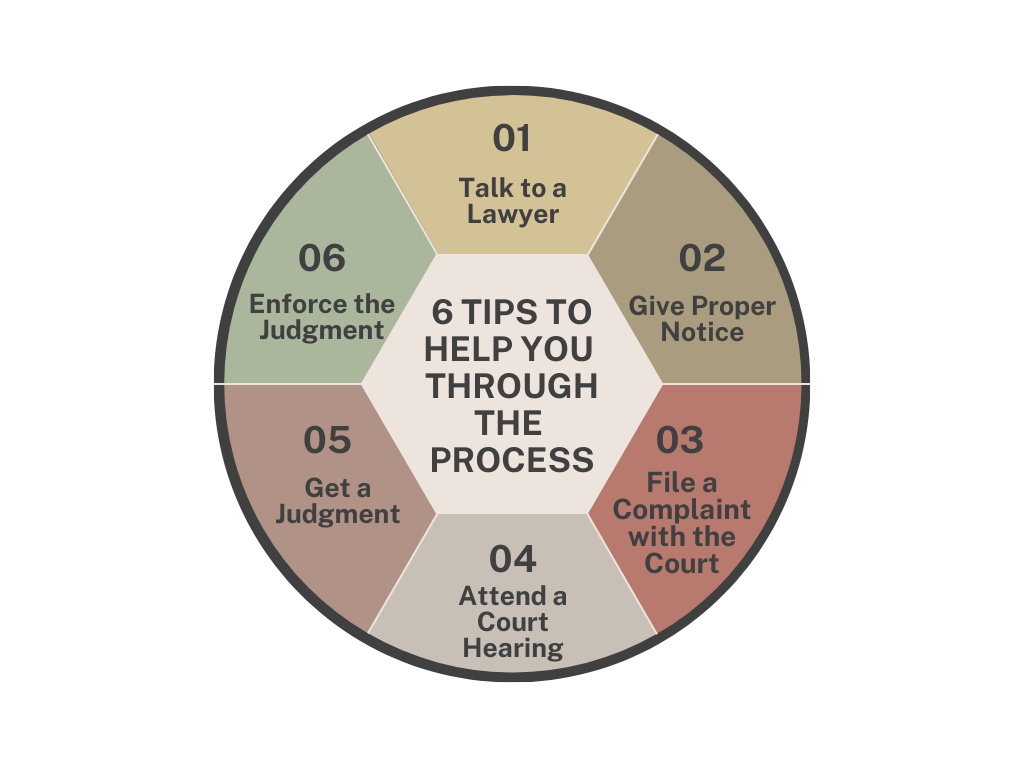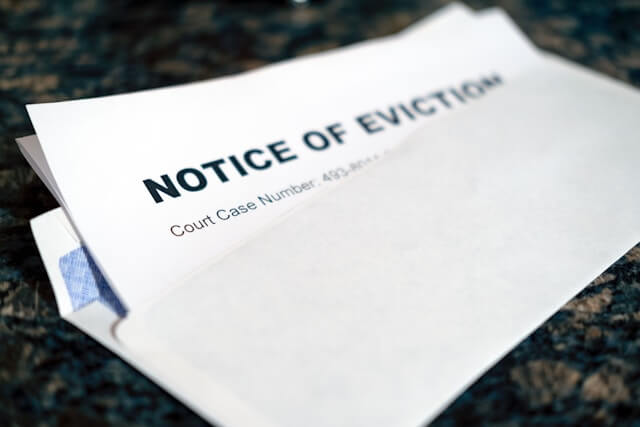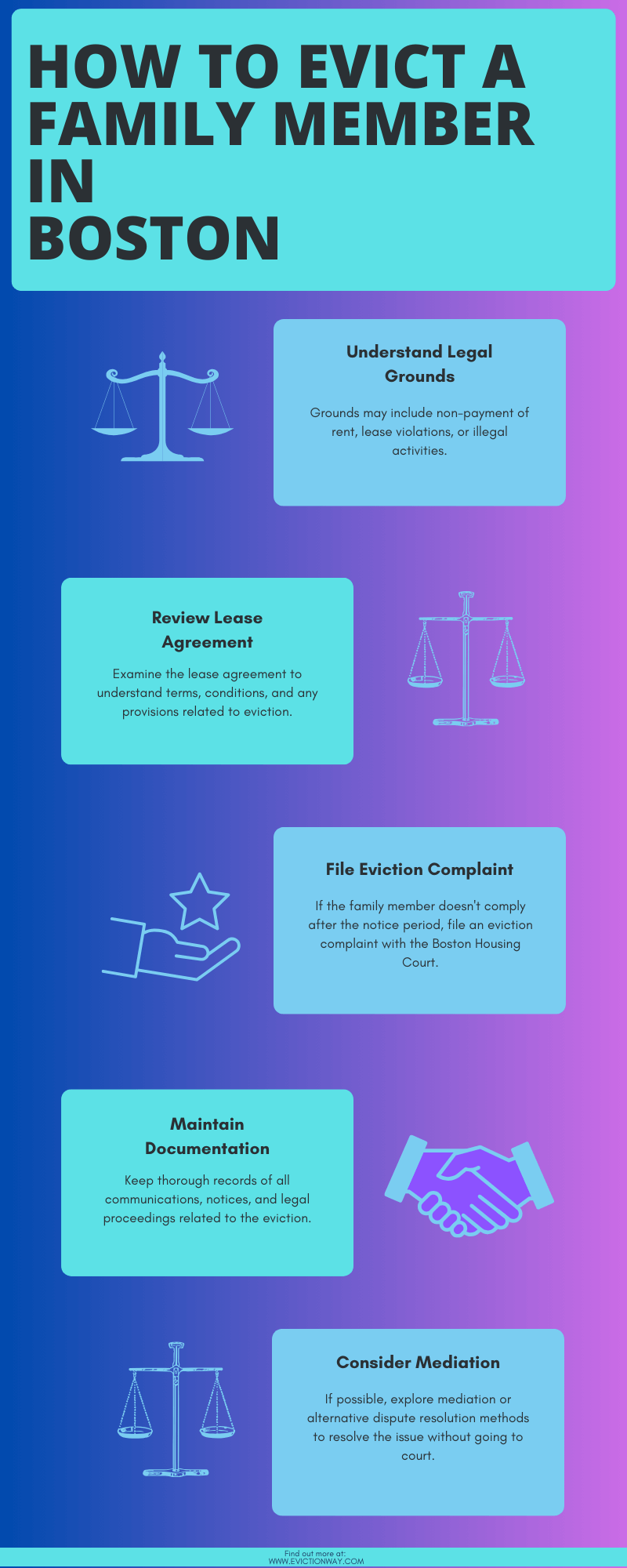Are you facing the difficult situation of needing to evict a family member in Boston? You’re not alone. Many people find themselves in this position, and it can be a complex and emotional process. In this blog post, we’ll guide you through the steps involved in evicting a family member in Boston. We’ll cover everything you need to know, from the legal process to practical tips for making the transition as smooth as possible.
First, let’s talk about the legal side of things. Evicting a family member in Boston is a legal process that must be followed carefully. The first step is to give your family member written notice to vacate the property. This notice must include the date by which they must leave, as well as the reason for the eviction.
If your family member does not leave by the deadline, you can file a complaint with the Boston Housing Court. The court will then hold a hearing to determine whether or not the eviction is justified.
Now, let’s talk about the practical side of things. Evicting a family member can be a difficult and emotional process. Here are a few tips to help you make the transition as smooth as possible:
- Communicate clearly and honestly with your family member: Let them know why you’re evicting them and be prepared to answer their questions.
- Be respectful of their belongings: When packing up their things, be careful not to damage or throw away anything that belongs to them.
- Offer help with finding a new place to live: If possible, offer to help your family member find a new place to live. This will show them that you care about their well-being.

How To Evict a Family Member In Boston
Evicting a family member is never easy, but it may be necessary to protect your rights and property. If you’re considering evicting a family member in Boston, here are six tips to help you through the process:
1. Talk to a Lawyer
Before you take any action, it’s important to talk to a lawyer. A lawyer can help you understand your rights and options, and can guide you through the eviction process.
2. Give Proper Notice
In Boston, you must give your family member at least 14 days’ written notice before you can evict them. The notice must state the reason for the eviction and the date by which they must vacate the property.

3. File a Complaint with the Court
If your family member does not vacate the property by the date specified in the notice, you will need to file a complaint with the court. The complaint will ask the court to order your family member to leave the property.
4. Attend a Court Hearing
Once you have filed a complaint, the court will schedule a hearing. At the hearing, you will need to present evidence to support your claim for eviction. Your family member will also have the opportunity to present their side of the story.
5. Get a Judgment
If the court finds in your favor, it will issue a judgment of eviction. The judgment will order your family member to leave the property by a certain date.
6. Enforce the Judgment
If your family member does not leave the property by the date specified in the judgment, you will need to enforce the judgment. You can do this by hiring a constable or sheriff to remove your family member from the property.

How Much Does it Cost to Evict a Family Member in Boston?
Evicting a family member can be a difficult and expensive process. The cost of eviction will vary depending on the specific circumstances of the case, but there are some general costs that you can expect to incur.
| Expense Category | Estimated Cost | Notes |
|---|---|---|
| Court Filing Fee | $135- $195 | Varies based on the court and specific details of the case. |
| Service of Notice | $35 – $100 | Cost for delivering the eviction notice to the tenant. |
| Attorney Fees | $500 – $5,000+ | Wide range depending on the complexity of the case. |
| Additional Legal Costs | $100 – $1,000+ | May include motion fees, copy fees, etc. |
| Changing Locks | $100 – $300 | If needed, post-eviction to secure the property. |
| Storage of Belongings | $200 – $500+ per month | If the tenant leaves property behind. |
| Loss of Rental Income | Varies | Potential income lost during the eviction process. |
- Filing fees: The first step in the eviction process is to file a complaint with the court. The filing fee for an eviction case in Boston is $135 to $195.
- Service of process: Once you have filed your complaint, you will need to have the complaint served on the tenant. The cost of service of process will vary depending on the method of service.
- Attorney fees: If you are unable to represent yourself in court, you will need to hire an attorney. The cost of an attorney will vary depending on the complexity of the case.
- Court costs: In addition to the filing fee, you may also be responsible for other court costs, such as the cost of a hearing or a trial.
- Moving costs: If you are successful in evicting the tenant, you will be responsible for the cost of moving their belongings out of the property.
The total cost of evicting a family member in Boston can range from $500 to $5,000 or more. The best way to get an accurate estimate of the cost is to consult with an attorney.
FAQs: Evicting a Family Member in Boston
Evicting a family member can be a difficult and emotional process, but it is sometimes necessary to protect your rights and property. If you are considering evicting a family member in Boston, here are some of the most frequently asked questions:
Who can be evicted?
In Boston, you can only evict a family member if they are not a tenant. This means that they do not have a lease or rental agreement with you, and they do not pay rent. If your family member is a tenant, you will need to follow the eviction process for tenants.
What are the grounds for eviction?
There are several grounds for eviction in Boston, including:
- Non-payment of rent
- Violation of the lease or rental agreement
- Criminal activity
- Nuisance behavior
How do I start the eviction process?
To start the eviction process, you will need to file a complaint with the Boston Housing Court. The complaint must state the grounds for eviction and provide evidence to support your claims. Once you have filed the complaint, the court will schedule a hearing.
How do I evict someone without a lease in Massachusetts?
In Massachusetts, you cannot evict someone without a lease without following the proper legal procedures. This involves giving a written 30 days (minimum) notice to quit that must expire at the end of a rental period.
How fast can you evict someone in Massachusetts?
In Massachusetts, the fastest eviction process involves serving a 14-Day Notice to Quit for non-payment of rent. If the tenant doesn’t pay or vacate within 14 days, the landlord can file for eviction in court.
What happens at the hearing?
At the hearing, you will have the opportunity to present your case to the judge. Your family member will also have the opportunity to present their case. The judge will then make a decision about whether or not to evict your family member.
What happens if the judge orders an eviction?
If the judge orders an eviction, your family member will have a certain amount of time to vacate the property. If they do not vacate the property by the deadline, you can have the sheriff remove them.
Related:
How to Evict a Family Member in Alaska
